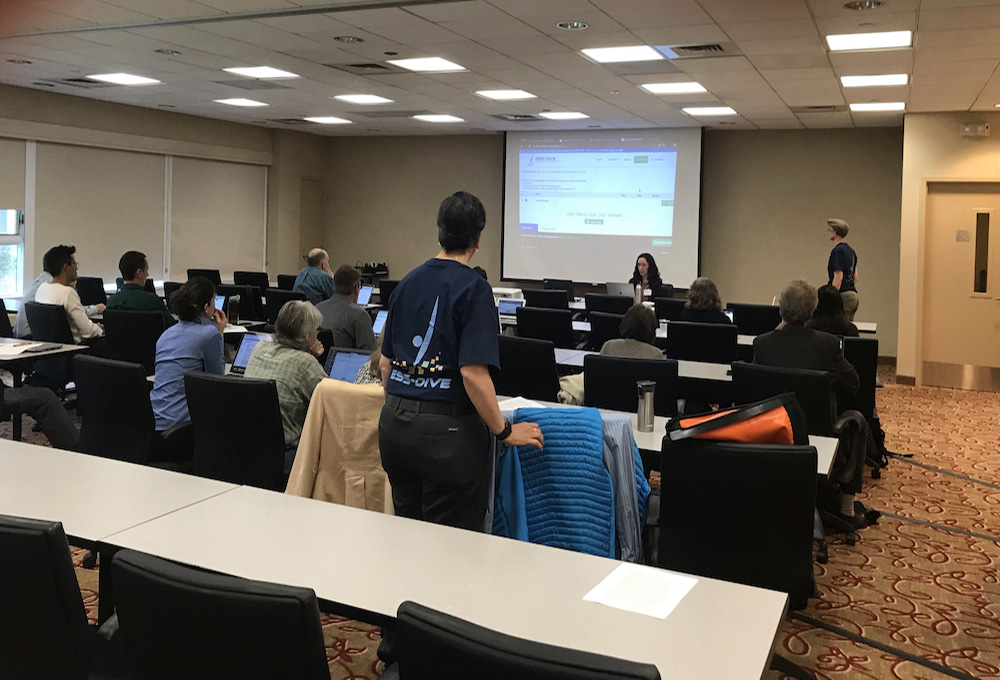To help improve access to and use of ESS data, the U.S. Department of Energy (DOE) supported the establishment of the Earth and Environmental Systems Science Data Infrastructure for a Virtual Ecosystem (ESS-DIVE).
In addition to storing and managing critical data, ESS-DIVE provides educational and community engagement opportunities. ESS-DIVE will host a free Community Data Workshop on November 9-10, 2022 from 9 am – 2 pm PT / 12 pm – 5 pm ET to support data management across collaborative ESS teams. The hands-on virtual workshop will help attendees efficiently manage their project data as a team and will also support teams as they describe, organize, and publish data.
“From tips and tricks that make data management easier to data publication best practices, the workshop is a great opportunity to receive first-hand support using ESS-DIVE,” says Joan Damerow, Community Engagement Lead Scientist. “This workshop is a unique opportunity for the ESS-DIVE team to work directly with the community through hands-on tutorials. The meeting aims to create a community environment to share information about ESS data, data management practices, and challenges.”
Like ESS-DIVE’s 2021 Community Data Workshop, the event is designed to introduce newcomers to ESS-DIVE and help those familiar with the initiative to sharpen their data practices. This year’s event will focus on new collaborative features and resources offered by ESS-DIVE that make working together on data management and publishing datasets easier. The workshop will cover topics such as how to submit, download, and manage data on ESS-DIVE. Participants can learn from one another and work together on data management solutions. Workshop participants can also learn about ESS-DIVE features, data, and vision.
Here’s what attendees of last year’s workshop had to say:
- “All speakers were very professional and well-prepared. I was impressed with how well-organized and thoughtful this event was.”
- “As a new user, these sessions gave me a great start.”
- “Open discussions with other scientists trying to use ESS-DIVE services is most helpful. Hands-on time is always the best way to learn and engage.”
- “These sessions helped get me oriented to what I need to do to begin, and where to go if I need help.”
Registration for the ESS-DIVE Community Data Workshop is now open. While attendees are encouraged to attend bothdays to gain the most value, participants are welcome to only join sessions of interest. You can register here. During each session, participants will have plenty of time to share questions, comments, and other thoughts with the ESS-DIVE team. Before the event, ESS-DIVE will send attendees some quick instructions on preparing for tutorials and discussion. To learn more about the workshop or about ESS-DIVE in general, please visit the workshop event page or contact ess-dive-support@lbl.gov.
About ESS-DIVE
The U.S. Department of Energy’s ESS-DIVE is an open data archive. It stores and improves access and usability of critical data to help address important environmental challenges. The data is sourced from observational, experimental, and modeling research funded by the DOE’s Environmental System Science (ESS) program, within the U.S. Department of Energy’s Biological and Environmental Research (BER) Program.
ESS-DIVE is funded by the Data Management program within the Earth and Environmental Systems Science Division under the DOE’s Office of Science Biological and Environmental Research program and is maintained by Lawrence Berkeley National Laboratory.


